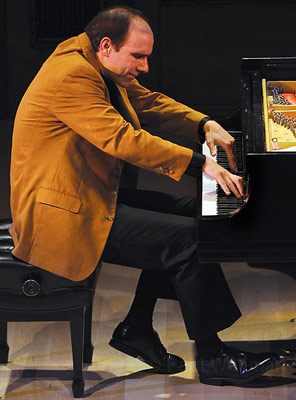Christopher Taylor, piano
At the Music Academy of the West's Hahn Hall, Wednesday, July 9.

Christopher Taylor does not look as if he intends to save the world. He wore a beige jacket for his recital at Hahn Hall last Wednesday, and clearly had his mind more on the music than on making a splash. Yet he played an extraordinarily important recital of Olivier Messiaen’s Vingt regards sur L’Enfant-Jesus, stunning in its virtuosity and significant for the future of music as well. By the end, an astonished audience realized that it had heard not just beauty, but truth. Through Taylor’s performance, Messiaen’s Modernist vision of religious devotion managed to transcend both Modernism and organized religion.
The work has an extraordinary history. Messiaen, drafted by the French Army as a medical orderly, was captured by the Germans and kept in a prisoner-of-war camp for the year 1940. Upon his release into occupied France in 1941, he composed very little for two years, and then began writing this extraordinarily challenging work for his wife, Yvonne Loriod. The despair of 1944 and 1945, as an exhausted Europe brought the Second World War to a close, can hardly be described, yet Messiaen chose this moment to create a 20-movement work of religious contemplation on the infant Jesus. The result is a triumphant assertion of selflessness in the face of the destruction; a celebration of peace after years of war; and a moment of calm thought as guns were silenced.
Taylor clearly understands this complex work, and presented it to us on Wednesday in the spirit of generosity that its composer wanted. Despite monumental technical challenges-Vingt regards contains some of the fastest and the slowest passages in all of music-Taylor never showed off or made anything more important than really hearing the work, with its birdsong in the upper register (Messiaen was also an ornithologist), its Balinese-influenced percussive effects in the lower register, its oddly cerebral mathematical effects in the harmony and melody, and finally, the simple, controlled cadences that brought time to a standstill. Taylor played a virtuoso work that is not about virtuosity; a masterwork that is not about mastery; a monument to genius that is not about monuments to great composers or performers. The work and Taylor’s performance are about what remains of humanity when egotism is silenced, and the sound of what truly matters emerges. It may be the sound of a better future. Listen.



